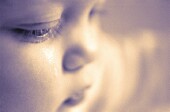- Double Mastectomy May Offer No Survival Benefit to Women With Breast Cancer
- Toxic Lead Found in Cinnamon Product, FDA Says
- Certain Abbott Blood Sugar Monitors May Give Incorrect Readings
- Athletes Can Expect High Ozone, Pollen Counts for Paris Olympics
- Fake Oxycontin Pills Widespread and Potentially Deadly: Report
- Shingles Vaccine Could Lower Dementia Risk
- Your Odds for Accidental Gun Death Rise Greatly in Certain States
- Kids From Poorer Families Less Likely to Survive Cancer
- Tough Workouts Won’t Trigger Cardiac Arrest in Folks With Long QT Syndrome
- At-Home Colon Cancer Test Can Save Lives
Infants’ Response to Talking Faces May Be Clue to Autism


Infants who shifted their gaze from faces of people who were speaking were more likely to be diagnosed with autism when they were older, a new study reveals.
This is the first time that this type of abnormal response to speech at a young age has been linked to a future diagnosis of autism, the authors noted.
The researchers used eye-tracking technology to map the eye movements of 99 infants at 6 months of age as they were shown videos of still, smiling and speaking faces. The children were checked for a diagnosis of autism when they were 3 years old.
Infants who later developed autism not only looked at all faces less than other infants, but also looked away from important facial features such as the eyes and mouth when a face was speaking.
The findings suggest that in infants who are later diagnosed with autism, speech disrupts the normal processing of faces. This can impair children’s social and communication links with others and affect their social development, according to study author Dr. Frederick Shic of the Yale University School of Medicine.
The study was published in the February issue of the journal Biological Psychiatry.
Although the study found an association between shifting gazes from faces in infants and later diagnosis of autism, it did not establish a cause-and-effect relationship.
Autism can’t be diagnosed until a child is at least 2 years old, but these and other findings show that autism-related behavior and attention problems may be present as early as 6 months of age, according to a journal news release.
If children with autism are identified at such an early age, it may be possible to develop ways to assist their social development, the news release suggests.
“It seems clear that brain changes related to autism appear much earlier than we traditionally diagnose this disorder,” journal editor Dr. John Krystal said in the release. “This study elegantly illustrates that autism-related disturbances in social relatedness are present very early in life, shaping one’s most fundamental social contacts.”
More information
The U.S. National Institute of Neurological Disorders and Stroke has more about autism.
Source: HealthDay
Copyright © 2024 HealthDay. All rights reserved.










